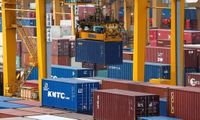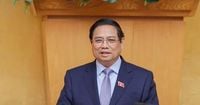On May 6, 2025, Prime Minister Pham Minh Chinh chaired the regular Government meeting for April 2025, where he addressed the socio-economic situation for the month and the first four months of the year. The Prime Minister highlighted the successful organization of events commemorating the 50th anniversary of the South Liberation and national reunification, along with the inauguration and commencement of 80 major projects across the country.
In his opening remarks, Prime Minister Chinh emphasized the need to maintain a "rapid and bold" spirit as the nation moves forward. He called for focused discussions on new developments, the government's direction, and the specific results achieved by various sectors and localities. The Prime Minister stressed the importance of achieving an economic growth rate of 8% or higher and responding effectively to the new tariff policies from the United States.
During the meeting, the Prime Minister urged participants to prepare thoroughly for the upcoming Central Conference and the 9th session of the 15th National Assembly, which is set to discuss a significant number of laws and resolutions. He also mentioned the need to reorganize the governmental structure from the central to local levels to improve efficiency.
As the meeting progressed, the Prime Minister pointed out the importance of implementing four key resolutions from the Politburo. These include Resolution No. 57-NQ/TW, which focuses on breakthroughs in science and technology, innovation, and national digital transformation; Resolution No. 59-NQ/TW on international integration; Resolution No. 66-NQ/TW regarding legal construction and enforcement; and Resolution No. 68-NQ/TW on developing the private economy.
In addition to economic discussions, the Prime Minister noted the need to prepare for negotiations with the United States, as well as activities commemorating the 135th birthday of President Ho Chi Minh and the 80th National Day of Vietnam. The government is expected to inaugurate and commence several significant projects and exhibitions showcasing socio-economic achievements during these celebrations.
At the opening session of the National Assembly on May 5, 2025, Prime Minister Chinh announced that the first negotiation session with the United States regarding countervailing duties would take place on May 7, 2025. This announcement comes amid discussions of the potential impact of U.S. tariffs, which have raised concerns among various sectors.
In related news, Malaysian Prime Minister Anwar Ibrahim stated on May 5, 2025, that the United States' projected 24% countervailing duty on Malaysian goods may decrease. This statement was made during a special parliamentary session where the Prime Minister emphasized the importance of strong economic negotiations with the U.S.
Prime Minister Anwar noted that Malaysia is one of 18 partners currently negotiating with the United States regarding countervailing duties. He mentioned, "I want to emphasize that this assessment is only in the early stages. No final decision has been made. We welcome the willingness to negotiate from the U.S. side."
He reassured the public that his government would not compromise on core policies and interests. A strong economy would ensure smoother negotiations, rather than merely chasing after partner demands. He expressed confidence that, with the country's potential and a skilled workforce, things would improve.
During the parliamentary session, lawmakers engaged in lively discussions about tariffs and their potential impacts. Minister of Investment, Trade, and Industry Abdul Aziz is expected to deliver a significant speech on the government's strategy during this session.
On April 2, 2025, President Donald Trump announced a list regarding countervailing duties, which has raised concerns among Southeast Asian nations. Cambodia faces the highest rate at 49%, followed by Laos at 48%, Vietnam at 46%, Myanmar at 44%, Thailand at 36%, and Indonesia at 32%.
The discussions surrounding tariffs have highlighted the complex dynamics of international trade, especially in the context of U.S.-Southeast Asian relations. The Malaysian Prime Minister's cautious optimism reflects a broader sentiment among regional leaders as they navigate the challenges posed by changing trade policies.
As Vietnam continues to focus on achieving its economic growth targets, the government's proactive approach to engaging with international partners will be crucial. The upcoming negotiations with the United States and the successful execution of major projects will play a significant role in shaping the country's economic landscape in the months ahead.
In conclusion, both Vietnam and Malaysia are actively addressing the challenges posed by new tariff policies from the United States, with their leaders emphasizing the importance of strong negotiations and economic resilience. The outcomes of these discussions will not only impact their respective economies but also the broader regional trade dynamics in Southeast Asia.





